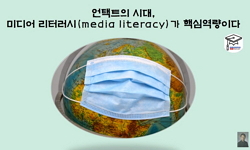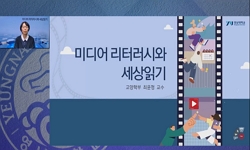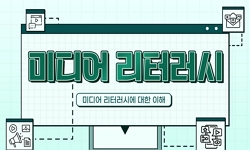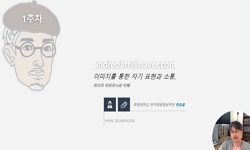This study analyzes the perception survey of the general public on the problems of a neologism(new words), which are frequently used in media media, and derives improvement measures and implications based on the data. In general, it can be seen that t...
http://chineseinput.net/에서 pinyin(병음)방식으로 중국어를 변환할 수 있습니다.
변환된 중국어를 복사하여 사용하시면 됩니다.
- 中文 을 입력하시려면 zhongwen을 입력하시고 space를누르시면됩니다.
- 北京 을 입력하시려면 beijing을 입력하시고 space를 누르시면 됩니다.

언론미디어의 신어(新語) 사용 문제와 개선 방안 = Problems with the use of a Neologism in media and ways to improve them
한글로보기부가정보
다국어 초록 (Multilingual Abstract)
This study analyzes the perception survey of the general public on the problems of a neologism(new words), which are frequently used in media media, and derives improvement measures and implications based on the data. In general, it can be seen that the creed is exposed and used indiscriminately through media, and those in their 20s and 30s are positive for the use of new words and those in their 50s and 60s are relatively negative. The biggest problem is that excessive use of creed can cause conflict and alienation between generations, and the need for correct Korean use is recognized overall as it can enhance Hangeul destruction and inappropriate social awareness. However, media outlets often use new words in a positive way to induce interest and enrich content by using them in the right place for the latest trends, such as small but certain happiness. As an alternative to this problem, self-purification of media workers is the most important, and it is recommended to encourage proper use of Korean through media literacy education and campaigns.
참고문헌 (Reference)
1 장소영 ; 김양순, "주어-동사 일치의 통사적 유인" 국제문화기술진흥원 7 (7): 353-358, 2021
2 "https://www.sisain.co.kr/news/articleView.h tml?idxno=45978"
3 "https://m.khan.co.kr/opinion/correspondentcolumn/article/201912101538001"
4 "Why 26 Korean words have been added to Oxford English Dictionary"
5 Di Wu ; 김은실, "Understanding Motivations and Engagement Outcomes of Social Media Television Coviewing" 한국인터넷방송통신학회 10 (10): 1-13, 2021
6 Moon Geum-hyun, "Type classification and generation principle of modern Korean new language" 33 : 1999
7 Moon Geum-hyun, "Type classification and generation principle of modern Korean new language" 33 : 1999
8 Dominic wireposts, "The new words coined by journalists which could make it into the dictionary"
9 Nam Ki-sim, "The creation and death of new language: The question of the Korean language" Iljisa 1983
10 Kang Shin-hang, "The aspect of using modern Korean vocabulary" Taehaksa Temple 1991
1 장소영 ; 김양순, "주어-동사 일치의 통사적 유인" 국제문화기술진흥원 7 (7): 353-358, 2021
2 "https://www.sisain.co.kr/news/articleView.h tml?idxno=45978"
3 "https://m.khan.co.kr/opinion/correspondentcolumn/article/201912101538001"
4 "Why 26 Korean words have been added to Oxford English Dictionary"
5 Di Wu ; 김은실, "Understanding Motivations and Engagement Outcomes of Social Media Television Coviewing" 한국인터넷방송통신학회 10 (10): 1-13, 2021
6 Moon Geum-hyun, "Type classification and generation principle of modern Korean new language" 33 : 1999
7 Moon Geum-hyun, "Type classification and generation principle of modern Korean new language" 33 : 1999
8 Dominic wireposts, "The new words coined by journalists which could make it into the dictionary"
9 Nam Ki-sim, "The creation and death of new language: The question of the Korean language" Iljisa 1983
10 Kang Shin-hang, "The aspect of using modern Korean vocabulary" Taehaksa Temple 1991
11 Ministry of Culture, Sports and Tourism, "Survey on the use of low-quality languages in broadcasting" 2012
12 Pat Myers, "Style Conversational Week 1337: New-word orders"
13 Kim Ki-tae, "Korean media’s dependence on press releases"
14 Choi Eun-jung, "Korean Language Education: A Study on the Reproduction of New Words in Newspaper Articles" 102 : 2015
15 Lee Seung Myung, "Interpretation of the new language" (19) : 2001
16 "Dot Wordworth Eurogeddon"
17 Lim Ji-ryong, "Cognitive semantics" Top Publishing House 2001
18 Kim Jaehee, "Both critics and fans are enthusiastic... The world right now is “#BongHive" syndrome"
19 National Institute of Korean Language, "2019 New Language Survey" 2020
동일학술지(권/호) 다른 논문
-
비대면 교육을 위한 메타버스 구축 및 활용 사례에 대한 연구
- 국제문화기술진흥원
- 김준호
- 2022
- KCI등재
-
예비유아교사 양성과정의 '유아 교재교구 연구 및 지도법' 교과목의 비대면 교수-학습 사례
- 국제문화기술진흥원
- 김지현
- 2022
- KCI등재
-
- 국제문화기술진흥원
- 최경환
- 2022
- KCI등재
-
대구대학교 특수교육-재활과학-사회복지 기반 학제 간 융합전공(장애인평생교육) 신설 논의
- 국제문화기술진흥원
- 김영준
- 2022
- KCI등재




 ScienceON
ScienceON eArticle
eArticle







